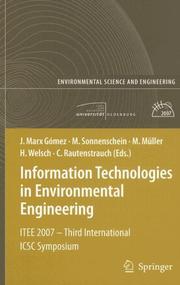| Listing 1 - 2 of 2 |
Sort by
|
Book
ISBN: 3642100015 3540883509 9786613693648 1280783257 3540883517 Year: 2009 Publisher: Dordrecht ; New York : Springer,
Abstract | Keywords | Export | Availability | Bookmark
 Loading...
Loading...Choose an application
- Reference Manager
- EndNote
- RefWorks (Direct export to RefWorks)
Information technologies have evolved to an enabling science for natural resource management and conservation, environmental engineering, scientific simulation and integrated assessment studies. Computing plays a significant role in every day practices of environmental engineers, natural scientists, economists, and social scientists. The complexity of natural phenomena requires interdisciplinary approaches, where computing science offers the infrastructure for environmental data collection and management, scientific simulations, decision support documentation and reporting. Ecology, environmental engineering and natural resource management comprise an excellent real-world testbed for IT system demonstration, while raising new challenges for computer science. Complexity, uncertainty and scaling issues of natural systems form a demanding application domain for sensor networks and earth observation systems; modelling, simulation and scientific workflows, data management and reporting, decision support and intelligent systems, distributed computing environments, geographical information systems, heterogeneous systems integration, software engineering, accounting systems and control systems. This books offers a collection of papers presented at the 4th International Symposium on Environmental Engineering, held in May 2009, in Thessaloniki, Greece. Recent success stories in ecoinformatics, promising ideas and new challenges are discussed among computer scientists, environmental engineers, economists and social scientists, demonstrating new paradigms for problem solving and decision making.
Environmental engineering --Information technology --Congresses. --- Environmental monitoring --Data processing --Congresses. --- Environmental protection --Data processing --Congresses. --- Environmental protection --- Environmental engineering --- Environmental monitoring --- Environmental Engineering --- Environmental Sciences --- Civil & Environmental Engineering --- Earth & Environmental Sciences --- Engineering & Applied Sciences --- Data processing --- Information technology --- Biomonitoring (Ecology) --- Ecological monitoring --- Environmental quality --- Monitoring, Environmental --- Environmental control --- Environmental effects --- Environmental stresses --- Measurement --- Monitoring --- Environment. --- Environmental management. --- Pollution. --- Pollution, general. --- Environmental Monitoring/Analysis. --- Environmental Management. --- Chemical pollution --- Chemicals --- Contamination of environment --- Environmental pollution --- Pollution --- Contamination (Technology) --- Asbestos abatement --- Bioremediation --- Factory and trade waste --- Hazardous waste site remediation --- Hazardous wastes --- In situ remediation --- Lead abatement --- Pollutants --- Refuse and refuse disposal --- Environmental stewardship --- Stewardship, Environmental --- Environmental sciences --- Management --- Environmental aspects --- Applied ecology --- Engineering --- Environmental health --- Sustainable engineering --- Monitoring/Environmental Analysis. --- Environmental monitoring.

ISBN: 1280956577 9786610956579 3540713352 3540713344 364209046X Year: 2007 Publisher: Berlin : Springer,
Abstract | Keywords | Export | Availability | Bookmark
 Loading...
Loading...Choose an application
- Reference Manager
- EndNote
- RefWorks (Direct export to RefWorks)
Potentially dangerous environmental changes are happening in the atm- phere, oceans, animal habitats and places where hazardous materials are used, or have been discarded without adequate environmental protections. These increasing problems that also affect human health demand for int- disciplinary approaches where engineers, natural scientists, economists and computer scientists work together. Information technology has become significant to all scientific groups and fields involved in environmental - gineering: Model based systems which enable the study of environmental changes have been developed and are being extended to manage those - vironments. New paradigms for designing objects to enable easy dis- sembly and recovery of components contribute to reuse. Web-based - formation systems enhance public awareness to environmental changes and allow participation in decision making. Developments in exploiting - ternative energy sources are reducing dependence on non-renewable - sources. Numerical economy-environment models contribute to co- benefit analysis of environmental policy, and environmental monitoring and accounting systems facilitate market-based environmental regulation. Further advance is only possible if scientific teams have adequate expe- ence, methods and tools for investigation of the changes in the envir- ment. Success requires a high level of organization related to technical as well as scientific and human aspects of information handling. This book publishes the results of the ITEE 2007 conference where information about the topics above has been presented and discussed among environmental engineers, computer scientists and economists. March 2007 Jorge Marx Gómez Michael Sonnenschein Martin Müller Heinz Welsch Claus Rautenstrauch VI Editors Prof. Dr.
Environmental protection --- Environmental monitoring --- Environmental engineering --- Pollution --- Data processing --- Information technology --- Environmental control --- Environmental effects --- Environmental stresses --- Engineering --- Environmental health --- Sustainable engineering --- Biomonitoring (Ecology) --- Ecological monitoring --- Environmental quality --- Monitoring, Environmental --- Applied ecology --- Measurement --- Monitoring --- Environmental management. --- Monitoring/Environmental Analysis. --- Environmental Management. --- Environmental stewardship --- Stewardship, Environmental --- Environmental sciences --- Management --- Environmental monitoring.
| Listing 1 - 2 of 2 |
Sort by
|

 Search
Search Feedback
Feedback About UniCat
About UniCat  Help
Help News
News